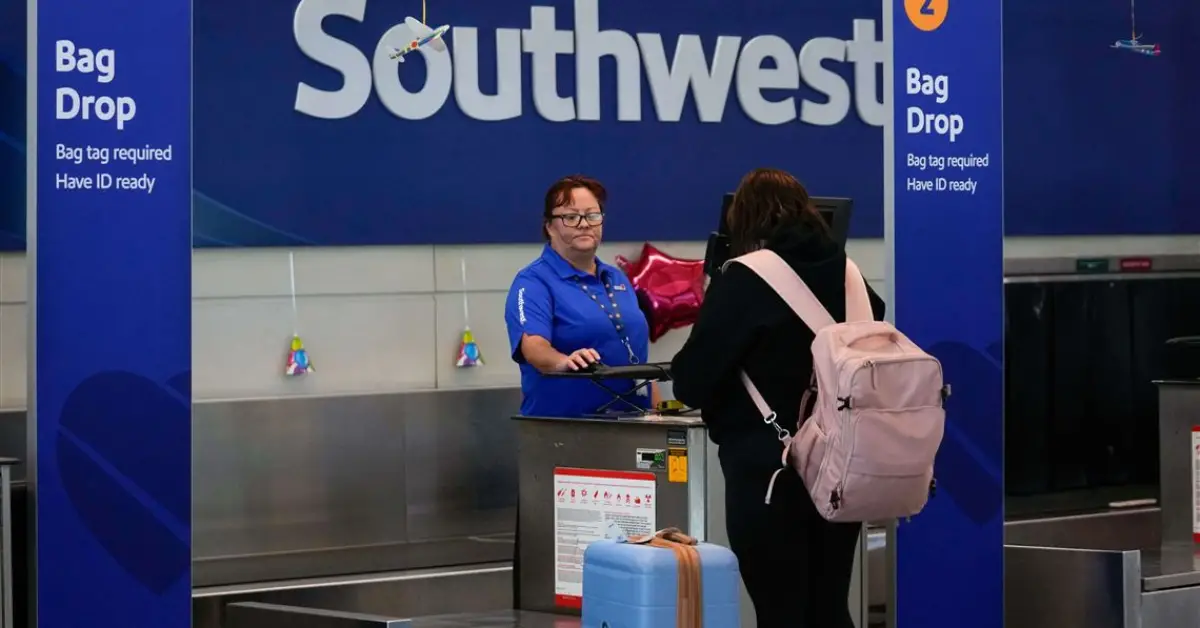Southwest Airlines, a major player in the U.S. airline industry, is facing a tough road ahead as it announces plans to end its long-standing policy of offering free checked bags to passengers. The airline has been known for this policy, which set it apart from many competitors who charge additional fees for checked luggage. However, the decision to scrap this benefit could have significant financial implications for the company.
Southwest Airlines‘ free baggage policy has been a major selling point for travelers. Many passengers chose Southwest over other carriers due to the absence of baggage fees, which can quickly add up when flying with multiple checked bags. For years, this perk has helped the airline build a loyal customer base, particularly among budget-conscious travelers who appreciated the ability to save on extra costs. Southwest’s customer-centric approach helped it become one of the most popular and respected airlines in the country.
But as fuel prices rise and inflation impacts the aviation industry, airlines are finding it harder to maintain the same low-cost fares. In an effort to improve its financial situation and remain competitive, Southwest has decided to cut one of its most popular benefits. While this move may help the airline save money, it could also cause it to lose its edge in a competitive market where many other airlines are also increasing their fees.
By removing free checked bags, Southwest is aiming to generate additional revenue to cover the rising costs of operations. Airlines typically charge passengers anywhere between $25 to $50 for the first checked bag, depending on the airline and the flight route. With millions of passengers flying each year, this new fee structure could bring in substantial revenue for the airline. However, the financial gain from these charges may not be enough to offset the potential losses in customer loyalty.
Many loyal Southwest customers are disappointed by this change, as it undermines the value proposition that Southwest Airlines once offered. Travelers who had come to expect free checked luggage now face the prospect of higher overall travel costs.
In response, some customers have expressed frustration on social media, with many saying that they will reconsider their choice of airline for future travel. This could result in a decline in Southwest’s market share, especially among cost-sensitive travelers who are likely to flock to budget airlines that still offer free checked bags.
Airlines that charge for checked bags have long been criticized for adding hidden costs to the price of a ticket. For years, Southwest Airlines gained a reputation for being transparent and offering an all-inclusive ticket price that didn’t include hidden fees. This move to start charging for checked bags is seen by some as a shift away from that model, which has made the airline’s business practices more transparent.

Despite the backlash, Southwest Airlines remains optimistic about its decision. According to the airline, the revenue generated from baggage fees will help ensure its ability to continue offering competitive fares and maintain profitability in an increasingly difficult market. However, the long-term success of this strategy remains uncertain.
Southwest Airlines may face challenges in regaining customer trust after eliminating free checked bags. If the move leads to a decrease in bookings or customer satisfaction, the airline could be forced to re-evaluate its decision. For now, the company is focused on weathering the financial storm and adjusting its business model to meet the needs of the modern traveler.
It’s also worth noting that other major airlines, including American Airlines, Delta, and United, already charge for checked bags. As a result, Southwest’s decision to introduce baggage fees brings it in line with industry standards. However, this change could make it harder for Southwest to differentiate itself from its competitors in the eyes of consumers.
The airline industry is known for its thin profit margins, and small changes in revenue can have a significant impact on an airline’s bottom line. While Southwest Airlines is hoping to offset rising costs by charging for checked luggage, the company must be careful not to alienate its customer base in the process. In the end, it will be important for Southwest to balance its financial goals with its commitment to customer satisfaction.
While Southwest may benefit in the short term from the additional revenue, it will need to assess the long-term consequences of this decision. The airline’s success depends on its ability to adapt to changing market conditions while keeping its loyal customers happy. As competition in the airline industry continues to grow, Southwest will need to find new ways to maintain its market position and continue to attract customers who value its low-cost, customer-focused service.
In conclusion, Southwest Airlines’ decision to end its free checked bag policy could result in a major shift for the airline. While the company aims to generate additional revenue to cover rising operational costs, it risks losing its competitive advantage and alienating customers who have come to rely on the airline’s free baggage policy. The long-term success of this move remains to be seen, and it will ultimately depend on how well Southwest is able to balance its financial objectives with customer satisfaction.




